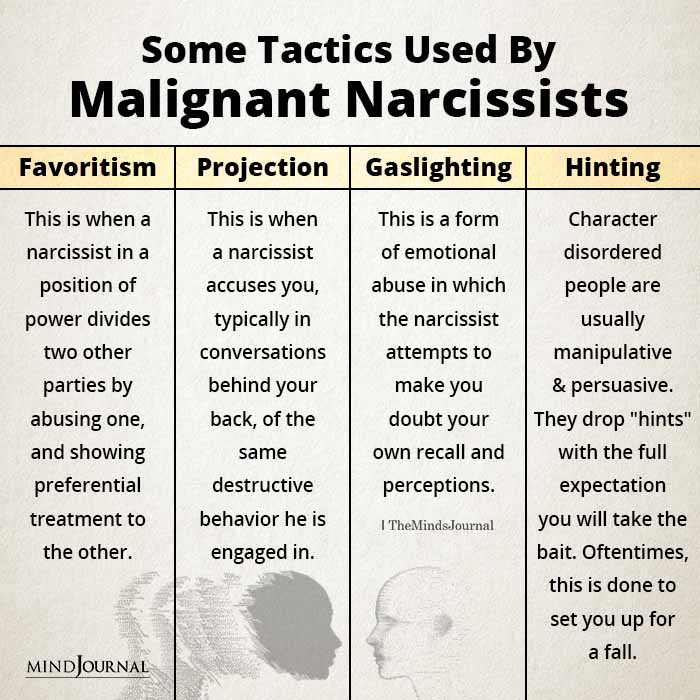Ever met someone who just seemed a little too… intense? Maybe they needed control, demanded admiration, or seemed to enjoy making others uncomfortable? These aren’t just common personality flaws – these are actually malignant narcissist traits.
Spotting these traits can help you steer clear of the emotional roller coaster that follows such people around. We’ll dive into exactly what is a malignant narcissist, the warning signs to watch out for, and how to deal with a malignant narcissist.
So, let’s get started shall we? We will begin with what is a malignant narcissist.
Related: Why Malignant Narcissists Inflict Great Harm, But Benign Narcissists Don’t
What is a Malignant Narcissist?
A malignant narcissist is someone with an extreme form of narcissism that combines intense self-focus with a taste for manipulation, cruelty, and control.
Unlike the classic narcissist, who might just crave admiration, malignant narcissists are out to dominate and even harm others to get what they want.
They rarely have any empathy, often blame others, and sometimes display hostile or even antisocial behaviors. This combination makes them particularly toxic and often leaves others emotionally drained or hurt.

Narcissist vs Malignant Narcissist: 6 Key Differences
- Intent to Harm: While narcissists often act in self-interest, malignant narcissists have an almost deliberate intention to hurt or control others.
- Empathy Levels: In the narcissist vs malignant narcissist debate, regular narcissists may have low empathy, but malignant narcissists usually lack empathy entirely and may even enjoy causing pain.
- Reactions to Criticism: A standard narcissist might get defensive, but a malignant narcissist could seek revenge or hold a deep grudge.
- Manipulation Tactics: While narcissists might charm or deceive, malignant narcissists often use more extreme forms of manipulation, like gaslighting and guilt-tripping.
- Moral Flexibility: When it comes to a narcissist vs malignant narcissist, malignant narcissists have little to no moral code and will cross boundaries without hesitation, while a typical narcissist might still maintain some ethical lines.
- Aggression Level: Malignant narcissists can be openly hostile, even violent, if they feel it serves their goals, while most narcissists will avoid direct conflict if they can still achieve their aims through charm or persuasion.
Now that we know the differences between narcissist vs malignant narcissist, let’s talk about some major malignant narcissist traits.
9 Malignant Narcissist Traits You Should Watch Out For
1. They are obsessed with having control.
A covert malignant narcissist needs control in all situations. They aren’t just bossy; they demand dominance in a way that often leaves others feeling powerless. They might manipulate, threaten, or guilt-trip to get their way, and if you resist, they’ll intensify their tactics, from passive aggression to open hostility.
It’s not about collaboration or compromise but about having the final say and ensuring you know it. This need for control can make you feel constantly on edge, as they’ll rarely back down until you’ve surrendered to their authority.
2. They are extremely vindictive.
Malignant narcissists hold grudges and never let go. If they feel insulted, slighted, or criticized, they’ll remember it indefinitely and might actively seek revenge.
Their response to perceived insults can be extreme, sometimes calculated and drawn out, as they enjoy watching others suffer for “wronging” them.
This trait makes them particularly toxic, as they may turn even small issues into major feuds. Their need for retribution creates a stressful environment for those around them, often leading to people walking on eggshells to avoid triggering their wrath.
Related: How to Spot Untrustworthy People and Why To Be Cautious
3. They feel delight in others’ pain.
People with a malignant narcissistic personality experience something called “schadenfreude,” or pleasure in others’ suffering. They might smile or express subtle joy when someone else is struggling, especially if it gives them a sense of superiority.
It’s not merely a lack of empathy; they sometimes actively cause others distress for amusement or a feeling of power. This enjoyment of others’ misfortunes reveals a darker, more sadistic side that often leaves those around them feeling uneasy.
This trait sets them apart from other narcissists, whose self-centeredness may not involve causing direct harm to others.
4. They are notorious for gaslighting.
One of the biggest malignant narcissist traits is this. They are notorious for gaslighting, which involves manipulating others into doubting their reality. They might deny things they said or did, twist facts, or make you feel irrational for having certain emotions.
This isn’t just lying; it’s calculated, psychological manipulation meant to keep you off balance and dependent on them. Over time, gaslighting can erode your self-confidence, making you question your sanity.
It’s a tactic they use to control and dominate, as the constant self-doubt and confusion leave you more vulnerable to their influence.
5. They are pathological liars.
Lying is second nature to a covert malignant narcissist. Unlike occasional dishonesty, these lies are often elaborate, designed to deceive, manipulate, or maintain their power. They lie about things big and small, creating a false reality that suits their narrative.
Their skill in lying is so refined that it’s hard to tell when they’re being truthful. This habit of dishonesty serves multiple purposes: protecting their image, deflecting blame, or manipulating someone else’s perception.
Over time, these lies can leave you unsure of what’s real, eroding trust and leaving you isolated.
6. They feel zero remorse.
Another one of the major malignant narcissist traits is this one right here. They have an almost complete absence of guilt or remorse.
When they hurt others, they don’t feel the moral consequences most people would. Instead of regretting their actions, they may even feel justified, believing others “deserved” what happened.
This lack of remorse enables them to act in ways most people would find unconscionable, without losing sleep over it. Their moral compass is skewed entirely in their favor, and they’re able to rationalize even the most hurtful behaviors if it suits their agenda or personal desires.
Related: How A Narcissist Poisons You And Your Whole Being
7. They love playing the love-bombing and devaluing cycle.
Initially, a malignant narcissistic personality might sweep you off your feet with overwhelming affection and attention, known as “love-bombing.” But as soon as you’re invested, they’ll abruptly withdraw that warmth, often acting distant or cold.
This cycle of “love and abandonment” creates a psychological bond where you crave their validation, as you’re never sure when the affection might return.
They use this cycle to keep you emotionally hooked, leaving you wanting the initial kindness back, which feeds their ego and sense of control over your emotions.
8. They are chronic blame shifters.
They are masters at blaming others. When faced with problems, they never accept responsibility, instead shifting the fault onto someone else. This habit keeps them free from accountability while making others feel guilty or at fault.
By constantly shifting blame, they maintain a pristine self-image and avoid facing their flaws.
This tactic can make you question your own actions, often leaving you feeling as if you’re the problem, which allows them to keep control without ever addressing their own harmful behavior.
9. They have an insatiable need for power and status.
What is a malignant narcissist? They don’t just crave admiration; they need power over others to feel fulfilled. They’ll go to great lengths to achieve a position of control, whether through manipulation, deception, or stepping on others.
This hunger for dominance can lead them to exploit, lie, or undermine others to rise in social, personal, or professional settings. It’s more than a desire to be liked – they need to feel superior and in charge.
This need for control drives much of their behavior and often leaves a wake of hurt and disillusioned people around them.
Okay! Now that we have discussed the malignant narcissist traits, let’s talk about how to deal with a malignant narcissist.
How To Deal With A Malignant Narcissist?
1. Have unbreakable boundaries.
Malignant narcissists love to push limits. So, how to deal with a malignant narcissist? Decide what’s acceptable and what’s not, and stick to it.
Let them know that certain behaviors won’t be tolerated, and be prepared to reinforce your boundaries if they try to overstep.

2. Practice the Grey Rock Technique.
This involves responding in a way that’s as dull and unemotional as possible. A covert malignant narcissist thrives on drama, so if you give them no reaction, they’ll lose interest. Keep interactions brief, neutral, and to the point.
Related: Toxic Relationship Recovery: Using the Gray Rock Method (Safely)
3. Make sure you don’t overshare in front of them or with them.
The less they know about you, the less ammunition they have. Avoid sharing personal details that they could twist or use against you later. Keep conversations superficial and avoid giving away any vulnerabilities.
4. Always, always document everything.
If you are wondering how to deal with a malignant narcissist, then this is non-negotiable. They can be very manipulative and deny past behaviors or statements.
By keeping records, you can protect yourself if they try to distort the truth. Notes, emails, or screenshots can help you keep track of what’s really happening.
5. Seek support from others.
Dealing with a malignant narcissistic personality can be isolating, so connect with people you trust. Friends, family, or support groups can offer perspective, emotional support, and validation, reminding you that you’re not the problem.
Takeaway
Malignant narcissists manipulate, control, and gaslight those around them, making life feel like a constant power struggle.
However, when you are able to recognize their traits, stay grounded in your own reality, and set firm boundaries, you protect your mental and emotional peace. Not giving them the satisfaction of riling you up is the best thing you can do, when it comes to dealing with them.











Leave a Reply